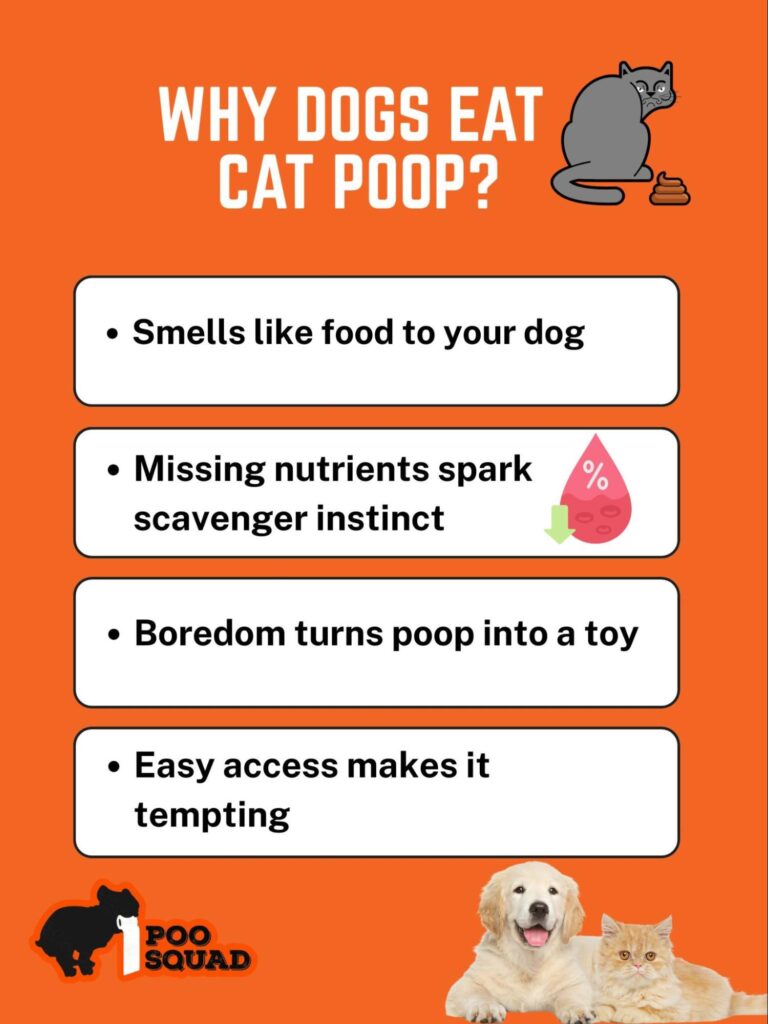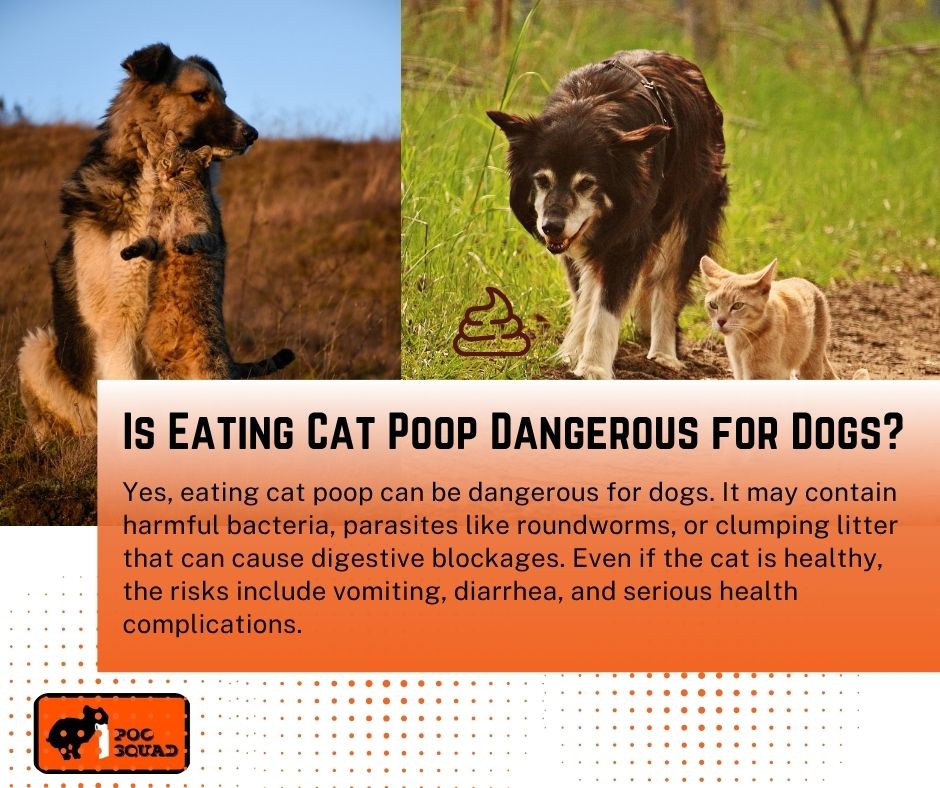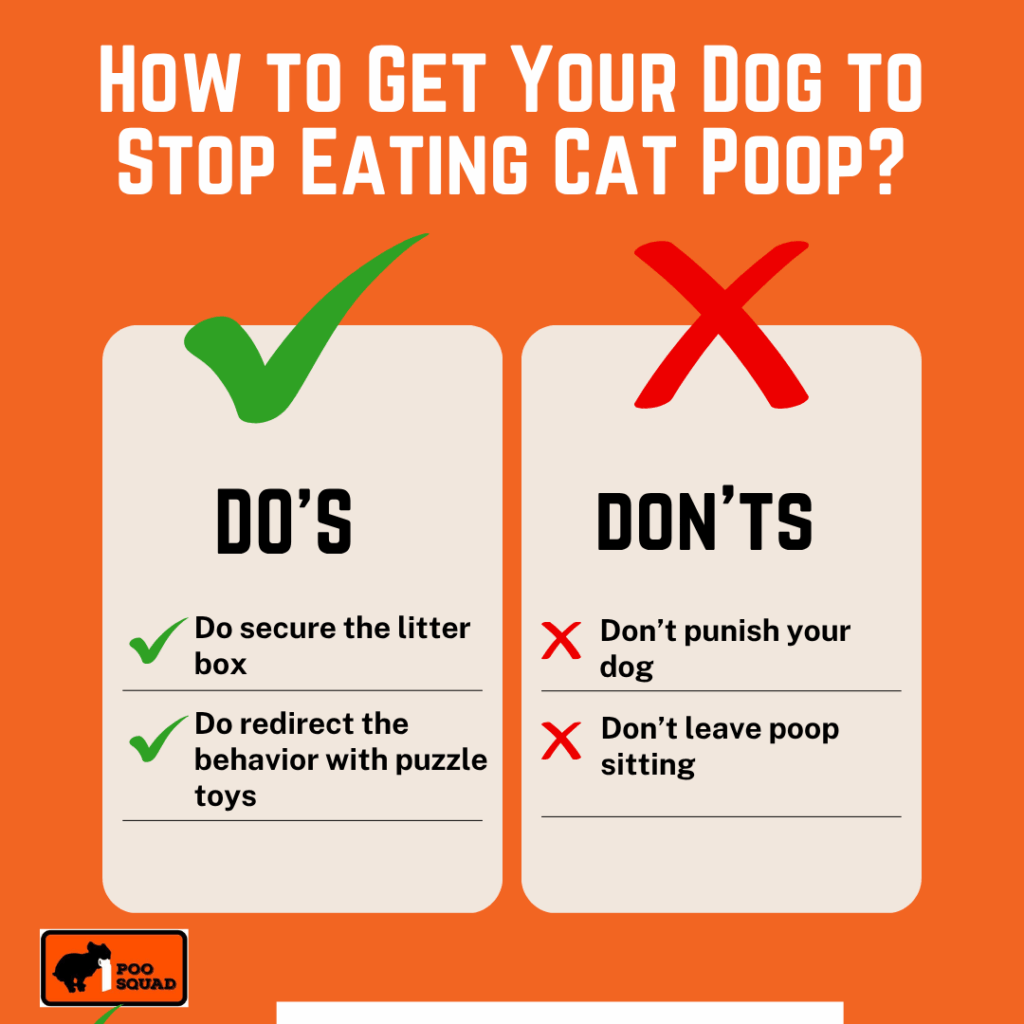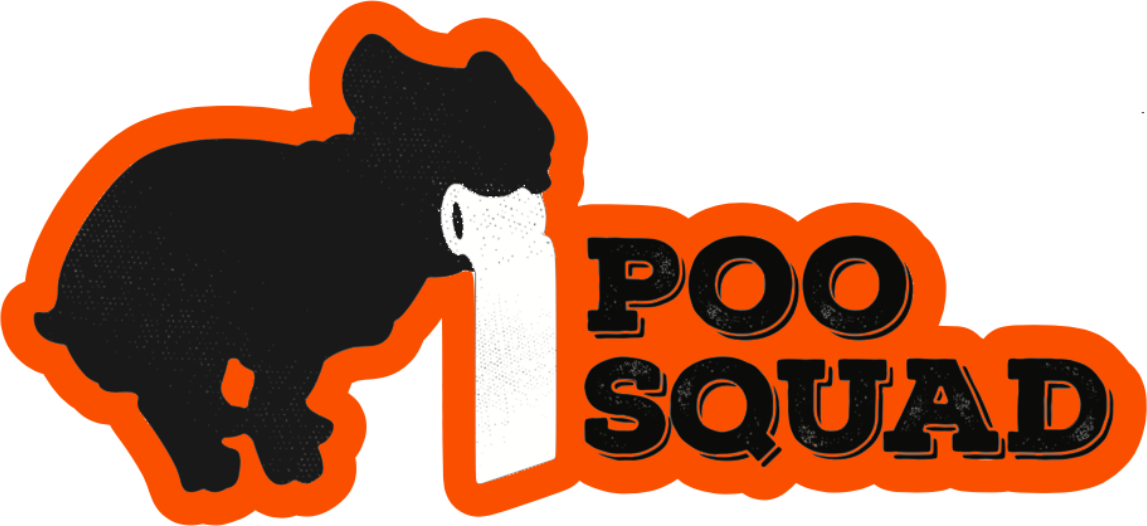Dogs eat cat poop because it smells like food, mimics nutrient-dense treats, or signals boredom, stress, or medical issues. While common, it carries health risks, from bacteria to parasites. So it’s best to prevent access and investigate root causes early.

Whether it’s biological drive, poor diet, enzyme imbalance, or simple boredom, cat poop offers a sensory reward dogs find hard to ignore. The good news? With the right steps, you can stop it.
We’ve seen it all, dogs raiding litter boxes, eating frozen “poopsicles,” and developing habits their owners never noticed until things got weird. That’s why we created the Dog Poop Report Card, so you know what your dog’s doing even when you’re not watching.
Want to know why your dog keeps sneaking snacks from the litter box, and what you can do to stop it for good?
Below, we break down the behavioral triggers, medical risks, and expert-approved fixes that actually work.
Is It Normal for Dogs to Eat Cat Poop?
It’s more common than most pet owners expect, and unfortunately, not as simple as “gross dog being gross.” The behavior even has a name: coprophagia. In the wild, this can serve a purpose, cleaning up the den, hiding signs of vulnerability from predators, or recycling nutrients in times of scarcity. But when it happens in your living room, it’s less survival instinct and more “why does my life smell like a litter box?”
For some pups, it’s oddly specific. You might notice they only eat poop from one particular cat. That usually means the flavor, or leftover nutrients in that cat’s diet, is hitting a little too close to the treat category. Especially if the cat’s been eating high-protein food or special formulas.
Then there’s the puppy phase. Young dogs often explore the world with their mouths and mimic behaviors they observe. If mom once “cleaned up” after her litter or they’ve seen other animals do the same, they may try it too. Most grow out of it. Some… need a little help.
Breed plays a role as well. Food-driven breeds like Beagles and Labradors are known offenders. Their noses lead the way, and once they’ve found the jackpot under the litter box, it can become a learned habit that sticks.
Over time, patterns start to emerge. Some dogs have predictable poop quirks. Those who snack on messes loaded with toys, underwear, or crayons?
‘We’ve come to know them as “Poocassos.” The ones who pace while dropping payloads around the yard? That’s a “Waddling Bandit.” Knowing your dog’s style gives you better control, and a few laughs when you need them most.
Want to skip the surprises in your own backyard?
Our service catches these patterns early and flags irregularities before they become problems. You’ll always know what your dog’s trying to tell you, without needing to follow them around with a bag and a gag reflex.
Is Eating Cat Poop Dangerous for Dogs?
Yes, it can be. While it’s not always an emergency, eating cat poop introduces risks that range from unsettling to downright harmful. Even a single mouthful can carry parasites, bacteria, or chemicals that your dog’s body isn’t equipped to handle.

One of the most common concerns?
Vomiting after the fact. Many pet owners report their dog throws up shortly after raiding the litter box. That’s often a red flag pointing to bacterial overload, foreign material irritation, or the gut saying, “yeah, no thanks.”
Coliform bacteria, like E. coli, thrive in feces. In fact, one gram can contain over 23 million of these little invaders. It doesn’t stop there: roundworms, hookworms, and other intestinal parasites can hitch a ride in the stool. Even if your cat appears healthy, these microscopic troublemakers can wreak havoc in your dog’s digestive system.
And then there’s the litter itself. Most cat litter contains clumping clay or chemical fragrances that aren’t safe for canine digestion. If your dog eats enough, it can cause blockages or toxic reactions. Think bloated belly, sudden lethargy, or even neurological changes, those are signs you don’t ignore.
So when should you call the vet? If your dog:
- Vomits more than once
- Shows signs of lethargy or weakness
- Has diarrhea that lasts longer than 24 hours
- Seems to be in pain or bloated
- Ingested a large amount of litter
Keeping them safe starts with eliminating temptation. Whether it’s litter box barriers, behavioral training, or removing access to surprise “snacks,” prevention is easier than treatment. If backyard messes are also part of the equation, our team makes sure nothing hazardous is left behind, because poop problems don’t come from cats.
Why Dogs Love the Litter Box: 9 Surprisingly Logical Reasons
For dogs, the litter box can seem less like a bathroom and more like a snack bar. It’s weird, frustrating, and totally explainable when you understand what’s going on behind the behavior. Here are nine reasons why your dog might be magnetically drawn to those forbidden nuggets:
1. It Smells Like a Protein-Rich Snack
Cat food is dense in protein and fats. If some of that food passes through undigested, the poop retains its aroma, and dogs are tuned into that like a bloodhound at a barbecue.
2. Missing Nutrients in Their Diet
When a dog’s body lacks digestive enzymes, B vitamins, or calories, they may go looking for it in unexpected places. Feces, as disgusting as it is, can offer a quick supplement… not the kind you’d ever recommend.
3. Boredom, Isolation, or Seasonal Blues
Winter brings shorter days and less outside time. Dogs stuck indoors with nothing to do may investigate the litter box out of sheer boredom or loneliness. It’s stimulation, and unfortunately, it rewards itself.
4. The “I Only Do It When You’re Gone” Effect
Many owners report: “My dog eats poop when I’m not home.” That’s separation stress at work. Without their person around, anxious pups may fixate on available targets, including the litter box.
5. Easy Access, Easy Mistake
A lot of litter box habits stem from opportunity. Boxes in open areas, shared rooms, or without covers are basically invitations. Your dog’s not naughty, they see a door that hasn’t been closed.
6. Accidental Reinforcement
If your dog eats poop and you rush in, yelling or scooping them up, that chaos can read as attention. It becomes a strange game:
poop = attention.
Breaking that cycle starts with neutral responses and changing the environment.
7. Hormonal or Medical Triggers
Conditions like Cushing’s disease, diabetes, or intestinal parasites can crank up a dog’s appetite in unnatural ways. Poop suddenly becomes part of their menu. A vet visit can rule out anything serious.
8. Cheap Food or Low-Fat Formulas
Dogs on low-fat or poorly balanced food may seek out richer sources. Cat feces might offer that missing punch of flavor they’re craving, even if it’s a terrible dietary decision.
9. They Like the Texture or Smell
It’s uncomfortable to imagine, but some dogs genuinely enjoy the taste, texture, or even the scent of certain types of litter. Clay, corn, and especially scented varieties can all become part of the appeal.
Knowing the why is half the battle. Removing temptation and improving diet are solid first moves. If you’re juggling other cleanup chores too, yard pickup services can help keep everything poop-free, even if your dog’s tastes are a little questionable.
Hidden Causes That Often Miss
Most explanations stop at diet or boredom. But after cleaning up behind thousands of dogs across dozens of neighborhoods, we’ve seen more nuanced reasons, some of them you’d never guess until it’s too late.
Copycat Behavior
Dogs learn from watching each other. If one dog develops a taste for litter box “treats,” others may follow. What starts as curiosity can turn into habit simply by mimicking a sibling’s behavior.
Enzyme Deficiency
When a dog’s digestive system lacks the proper enzymes, their body may crave the very things it’s failing to process. Cat feces might be a response to this gap, particularly if the behavior is sudden or obsessive.
Gate Fails and Dog-Proofing Gaps
We’ve seen it hundreds of times: “secure” yards with a gate that almost latches, or an indoor area where a door didn’t close all the way. That’s all it takes. One scooper’s mistake and you’ve got a dog knee-deep in what should’ve stayed buried.
Triple gate checks, clear pet zones, and cleanup routines built around actual dog behavior, not good intentions, go a long way. That’s why every Poo Squad visit ends with a photo of the latched gate, not a wave from the driveway.
“Can Probiotics Help, or Are They Just a Bandaid?”
It’s a valid question. Probiotics can support gut health, but if there’s an underlying enzyme or nutritional imbalance, they might only dull the symptoms. It’s worth trying, but always alongside deeper changes to food or routine.
Seasonal Triggers & Yard Design
Franchisees from colder climates have noticed spikes in poop-snacking during winter. Fewer walks, more indoor time, and snow-covered messes make access more tempting. Poorly lit corners or cluttered yards also hide poop longer, giving dogs more opportunity.
Past Trauma or Rescue Behavior
Some rescues carry food insecurity, even after they’re in a stable home. Eating poop may be a survival mechanism from a time when food wasn’t guaranteed. It’s not bad behavior, it’s fear in disguise.
DIY Mistakes: “I Just Mow It Over”
We’ve heard this one way too often: “I chop it up with the lawnmower.” Not only is that ineffective, it aerosolizes bacteria and spreads contamination across the yard. It also reinforces poop’s presence, which doesn’t help a curious dog’s temptation.
Sibling Rivalry or Jealousy
Is my dog doing this to send a message to the cat?
While that’s a little anthropomorphic, there is sometimes an attention dynamic at play. Dogs may associate the litter box with their “competition” and act accordingly.
Knowing these hidden causes helps you spot patterns before they become habits. And if yard cleanup is part of the equation, the difference in behavior once poop is fully removed, consistently and correctly, can be night and day.
Stories from the Poo Trenches
We’ve seen what dog poop can do to a home, a relationship, even a person’s mental health. These are the moments that stick with us, the ones you won’t find on typical pet blogs.
The Crying Mom and Four Months of Guilt
One of our earliest clients had come home from work. Her backyard had gone untouched for four months. The moment she saw her clean yard, she burst into tears. “You have no idea how happy I am,” she said. The poop wasn’t gross, it was a burden she couldn’t lift. Until that day.
Seniors and Clients with Mobility Challenges
Many of our most loyal clients are senior citizens or individuals with disabilities. Picking up after their dogs is painful, even dangerous. For them, poop cleanup isn’t a luxury, it’s a lifeline. Their gratitude is quiet but profound, and it’s why our team treats every yard with respect.
“You Saved My Marriage”
We’ve literally been told this. In families, no one wants the poop job, and when it doesn’t get done, tension builds. Arguments start. One parent gives in, silently resenting it. When we take that chore off the list, it’s not convenient. It’s relationship CPR.
Jamie Coones’ Post-Coma Purpose
Jamie, our founder, started this journey after surviving a coma and months of recovery. Building this business wasn’t about scooping poop, it was about creating something that gave back time, dignity, and financial freedom. That clarity shaped every part of the customer experience, from the orange uniforms to the “no poop left behind” policy.
Franchisees Who Go Beyond the Scoop
We’ve had franchise partners flag health issues after noticing changes in dog poop. One client found out their pup had a parasite because their scooper spotted something off. Another adjusted their dog’s diet based on regular report cards. This is poop with a purpose.
Lost Dog? A QR Tag Brought Her Home
Our free pet profile system includes custom dog tags with scannable QR codes. One client’s dog slipped out and was found hours later because a stranger scanned the tag and contacted them instantly. It’s a feature that doesn’t protect pets, it gives owners peace of mind no blog can replicate.
These stories aren’t rare, they’re the heartbeat of what we do. And they’re proof that sometimes, dealing with the dirty work makes all the difference.
How to Get Your Dog to Stop Eating Cat Poop
Whether it’s happening daily or once in a while, stopping this behavior takes more than yelling “no” across the room. You need a layered plan that addresses root causes, access points, and habits.
Step 1: Rule Out Medical Issues
Start with the basics. If your dog is obsessively eating cat poop, it could be more than a gross habit.
- Schedule a full vet check to rule out parasites, hormone imbalances like Cushing’s, or conditions like Exocrine Pancreatic Insufficiency (EPI).
- Audit your dog’s diet. Is it nutrient-rich? High enough in protein and fat? Cheap food or low-calorie blends can leave your dog craving more, and they might look for it in the litter box.
Getting a professional diagnosis is the only way to know if something deeper is going on.
Step 2: Sanitize and Secure the Litter Box
If the buffet’s still open, you can’t expect the behavior to stop.

- Block access. Gated rooms, cat doors, or elevated boxes are all effective. Covered boxes or top-entry models can help while minimizing stress on your cat.
- Address scent triggers. Switch to unscented litter and clean the box often. Strong odors signal “food” to some dogs.
- Scoop fast. The longer poop sits, the greater the temptation. This may require some tag-teaming with others in the house.
If your cat resists change, take it slow. Gradual relocation and positive reinforcement help reduce stress.
Step 3: Train and Redirect
Behavior change won’t happen without repetition and reward.
- Teach the “leave it” command, especially during supervised interactions near the box.
- Introduce boredom busters like treat puzzles, long-lasting chew toys, or food-stuffed Kongs. These redirect energy away from scavenging.
- Consider safe deterrents, products that make litter less appealing without harming your pet. Be sure it’s vet-approved.
- If the obsession persists, it might be time to bring in a professional trainer or behaviorist for a targeted plan.
Step 4: Sanitize Your Yard
The behavior often starts indoors but doesn’t end there. Dogs remember where the poop was, even if you think you got it all.
- Clean the yard thoroughly. Use pet-safe enzymatic sprays to remove scent trails and bacteria from grass or soil.
- Avoid bleach or ammonia-based cleaners, which can harm your dog and the lawn.
- With regular service, our crews handle both scooping and residue-free deodorizing, so nothing is left behind to attract repeat offenders.
What If Nothing Works?
Sometimes, even after you’ve cleaned up the yard, changed the litter box, enriched the environment, and taught every command in the book, your dog still snacks on cat poop. If that’s where you’re at, you’re not alone. And it doesn’t mean you’ve failed.
Consider Soft Muzzles or Supervised Access
For persistent cases, especially in multi-pet households or yards with lots of foot traffic, soft muzzles (designed for safety, not punishment) can be a temporary fix. Pair that with controlled outdoor time so you’re managing the opportunity, not only the behavior.
Reevaluate Your Household Setup
Dogs are emotional creatures. If they’re overstimulated, bored, or even competing for attention, they’ll act out in the weirdest ways. Reassess:
- Is your home routine chaotic?
- Are the pets clashing or competing?
- Is your dog getting enough calm interaction, not activity?
In households with multiple animals, especially rescues, the dynamic matters more than we think.
When It Points to Mental Health
Long-term coprophagia can be a symptom, not a quirk. Some dogs use it to self-soothe, especially those with trauma histories, past neglect, or separation anxiety.
If the behavior’s intense, emotional, and unshakable, it’s time to ask: Is my dog trying to tell me something deeper?
Time to Call in the Experts
If you haven’t yet, this is the moment to loop in a vet behaviorist, not a trainer. These are veterinary professionals trained to spot medical, emotional, and neurological reasons behind obsessive behaviors.
And if you need backup keeping your yard clear while you sort things out, our team helps keep the triggers out of sight, out of smell, and out of reach.
How Poo Squad Helps You Stay Ahead of the Problem
You can’t always control your dog’s instincts, but you can control their environment. That’s where we come in. Our systems are built not for convenience, but for prevention.
Gate Photos Mean No Surprise Access
Every visit ends with a photo of your closed, latched gate, so you know your dog didn’t sneak in behind us for a quick litter snack. It’s not service. It’s peace of mind.
Poop Report Cards = Early Health Clues
We flag anything out of the ordinary, texture, color, contents, because we know that changes in poop can signal problems before symptoms show up. When you’re not the one scooping, this reporting system keeps you in the loop.
8AM Service Reminders
Forget to scoop? Not on our watch. Our automated alerts ensure you never miss a visit and your yard stays poop-free before it becomes a problem.
QR Tags for Runaway Snackers
If your dog slips the fence in search of more “forbidden treats,” our custom dog tags (with QR codes) make it easier than ever for finders to contact you instantly and safely.
No Hose, No Trash Can? No Problem
We never use your tools or trash, because our job is to solve your poop problem, not move it around. That means everything gets cleaned, deodorized, and taken with us. Fully gone, fully handled.
Whether your dog’s cat poop habit is new, chronic, or somewhere in between, staying ahead of it starts with keeping the yard clean, the litter box off-limits, and the right pros in your corner.
Ready to Stop the Madness?
If your dog’s gross habit is stressing you out, you’re not alone, and you don’t have to handle it solo. Let us handle the dirty work (literally). From gate-check photos to detailed poop health reports, we take the load off your plate while helping your pet stay safe, clean, and poop-free.
Get started today with our hassle-free poop scoop plans
FAQs About Dogs Eating Cat Poop
Is eating poop a sign of a serious problem?
It can be, but not always. Sometimes it’s boredom or curiosity. Other times, it points to nutrient deficiencies, parasites, or anxiety. If it’s persistent, check in with your vet.
What if it just started suddenly?
A sudden change in behavior can signal stress, diet changes, or even medical issues. Rule out anything new, food, environment, dynamics, then look deeper if needed.
Can it be cured permanently or just managed?
Some dogs grow out of it, some need long-term management. The key is consistency, environmental control, and addressing any root cause, physical or emotional.
Is litter clumping more dangerous than poop itself?
Yes. While cat poop carries bacteria and parasites, clumping litter can harden inside the digestive tract, causing serious blockages. Keep it out of reach, always.
